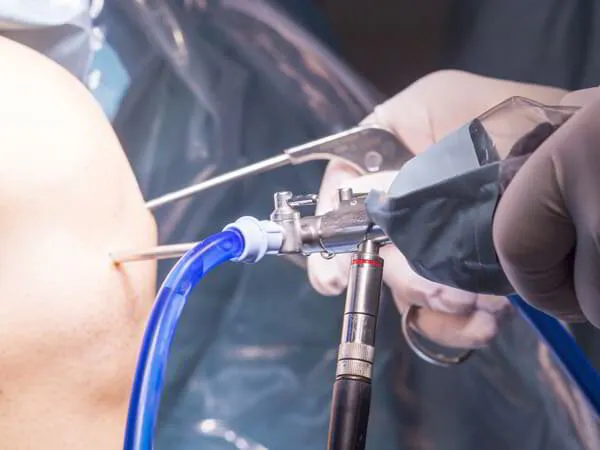Minimally Invasive Knee Joint Replacement
Home / Area of Specialty / Knee / Minimally Invasive Knee Joint Replacement
Dr. Pradyumna R carefully evaluate your conditions and symptoms associated to your knee pain or knee injuries, based on the diagnostic report and scan he would suggest if so, you are a candidate for Minimally Invasive Knee Joint Replacement procedure, he is an highly experienced knee treatment specialist provides diagnosis as well as surgical and nonsurgical treatment options at Bangalore Orthopaedic Clinic, in BTM Layout, Bangalore.
If you have any queries or would like to schedule an appointment for minimally invasive total knee joint replacement procedure or knee injury treatment consultation please call +919113025188.
What is Minimally-invasive knee joint replacement?
Minimally-invasive knee replacement is a very successful surgical treatment for knee arthritis. Over the years, minimally invasive knee replacement surgical techniques have been developed to lessen tissue trauma and improve patient outcomes.
This minimally invasive approach involves much smaller incisions than the usual 10–12 inch incisions used in the traditional knee replacement, and spares the quadriceps muscle and tendon from being cut to access the knee joint.
Minimally invasive knee joint replacement surgery usually involves minor incisions, resulting in fewer tissues cut and less potential for complications.
What are the advantages of Minimally-invasive knee joint replacement?
The potential advantages of minimally invasive surgery over traditional methods include:
- Smaller incision
- Less Pain
- Reduced surgical recovery time
- Resulting in less damage to muscle tissue
Minimally Invasive Knee Joint Replacement Procedure
An orthopaedic surgeon will perform this procedure, aided by a team of medical professionals. The whole process typically takes two to three hours. In general, here is what you can expect:
- The surgery is performed under sterile conditions in the operating room. If you decide to have surgery, you will be put to sleep with general anesthesia. Or you may experience local anesthesia and take a mild sedative.
- Your surgeon will minimize these risks by carefully choosing the best approach to surgery, controlling bleeding, and monitoring your vital signs during surgery.
- You may require antibiotics before and after surgery to prevent infection.
- Your surgeon will make an incision over the middle of your knee, through which he'll remove your damaged ligament and bone.
- After making an incision about 8 inches long, the surgeon will cut and remove the damaged bone in your thigh bone and shin bone.
- Next, implants are placed into the joint space. We then cement them into place to ensure that they remain stable and secure.
- In the vast majority of cases, the surgeon will also remove a portion of the underside of the kneecap to provide access to the diseased knee joint.
- This procedure involves the insertion of a plastic spacer into the space between metal implants, to increase mobility and improve flexibility.
What are the risks and complication?
Like in any surgical procedure, there are some risks as well associated with Knee replacement surgery.
- Blood clots
- Bleeding
- Infection
- Loosening or wearing out of the prosthesis
For more information on an Minimally-invasive knee joint replacement, total knee replacement, partial knee replacement surgery or knee resurfacing and the treatment options available, please call +919113025188 Dr. Pradyumna R, Orthopaedic knee specialist serving BTM Layout, Bangalore City.

